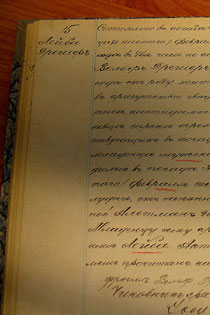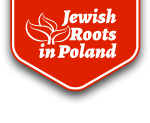Academic Genealogy
To be a professional in academic genealogy requires being involved in academic genealogy projects as well as in individual research. Without those many years of individual experience I would never have been able to write my PhD dissertation about the wonderful aspect of Jewish tradition – genealogy. To the best of my knowledge it was the first doctoral dissertation on Jewish genealogy ever written in a Polish University. I hope this work is only a prelude to the development of Jewish genealogy studies in my country.
“It is hard to imagine the history of Poland without the historical and intellectual contributions of Polish Jews. The catastrophe of the Holocaust irreversibly changed the ethnic fabric of Poland. In their time, Jews had constituted the largest minority in the country, with a illustrious history going back over one thousand years. Over three million of them were murdered at the hands of the Nazis, and in 1968 many of those remaining departed, adding to the immeasurable and irrevocable damage done to the community by the Shoah. Today, virtually all that remains of the former Jewish population of the country are material artifacts and the many documents stored in the national and municipal archives, registries, museums and libraries of Poland. The main purpose of contemporary documenting is to rescue memories of the residents of former shtetls (towns where Jews lived in significant numbers), to reassemble broken family trees, reconstitute the structure of lost communities, and preserve this knowledge for future generations.
Since the 1980s, Jewish genealogy has developed rapidly. Whereas in Poland, the study has been treated marginally as a domain supporting history, anthropology and sociology, in the world at large there has been a genealogical boom, as carried out both by family historians and social scientists (Klauzinska, 2007). A number of solutions to difficult genealogical problems are increasingly being proposed by researchers in hard-science fields (biologists, mathematicians, physicists, statisticians, computer scientists, and so on)(Wagner, 2006). Computer technology and the Internet have enabled programs to create intricate genealogical trees and specialized databases.”
Klauzińska K. (2013), „A Practical Introduction to Dataset Merging”, In: Lectures On Academic Genealogy. An Introduction To Scientific Tools, Weizmann Institute, Israel, editor: Daniel Wagner


Buy!
More on academic genealogy you can read in a books
”Selected Lectures on Genealogy”
”An Introduction To Scientific Tools”

You can buy book here.
Soon!
”Genealogia nie jeden ma sens. Współczesna genealogia Żydów polskich”
”Genealogy has no one sense. Modern Jewish genealogy of Polish Jews”
You can buy book here.
Who We Are
We are a Polish-Dutch researching team. For both of us Jewish genealogy has become a passion. Since more than 10 years we have been solving riddles, i.e. deciphering handwritten Polish, German and Old-Russian vital records, which has been only possible thanks to our knowledge of these languages. We perform professional genealogical research of your families back to its roots in the 18th century, taking you so on an exceptional journey to the past.
Mission Statement
Our mission is to provide high quality research on genealogy, as well as field tours for descendants of Polish Jews. For over 10 years we have been assisting individuals and families with Polish-Jewish roots, uncovering unknown aspects of their personal history and locating long-lost and sometimes unknown relatives. Our research experience is extensive, and we possess excellent command of several languages, and are familiar with many aspects of Polish and Polish-Jewish history, culture and customs. We often lecture about genealogy-related topics at international conferences and workshops, including in universities in Poland and abroad.
Our References
Being genealogical researchers for over 10 years has given us the unique opportunity to cooperate both with genealogists all over the world as well as with filmmakers, writers, and scientific institutions. From these contacts and meetings we have gained a great deal. We endeavor to use this knowledge and experience in our work. We therefore allow those who have trusted us and of whom we have learned a lot to speak.







